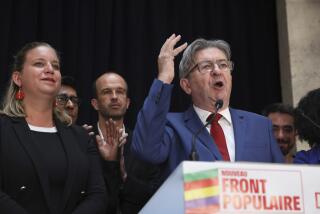Taiwan’s opposition wins big
- Share via
TAIPEI, TAIWAN — The opposition Nationalist Party won an overwhelming victory Saturday in closely watched Taiwanese legislative elections widely seen as a preview of March’s presidential contest.
The results were viewed as a vote of no confidence in the administration of President Chen Shui-bian, who has alienated many voters with his contentious style and policy reversals during a period of disappointing economic growth and increased tensions with Beijing.
The Chinese government did not issue a reaction, but it almost certainly is pleased with the results. It deeply dislikes Chen, and the Nationalist Party has called for closer economic and political ties with the mainland. China and Taiwan have been adversaries since a civil war led to political separation in 1949.
The Nationalists, led by former Taipei Mayor Ma Ying-jeou, secured 81 of the 113 seats up for grabs. The ruling Democratic Progressive Party, or DPP, won 27 seats, and the other five went to pro-Nationalist independents or minority parties.
Shortly after the final results were released late Saturday, Chen resigned as head of his party, but the move is not expected to affect his remaining two months as president.
“This is the worst and most disastrous defeat since the DPP was founded,” Chen said at a news conference. “I would like to take full responsibility.”
In a strangely timed move, China announced Saturday that it had selected 13 representatives for Taiwan “via a secret ballot” in its National People’s Congress, which meets once a year, according to the state-run New China News Agency. These would replace China’s earlier Taiwan delegates in the rubber-stamp body. China considers Taiwan part of its territory and has vowed to take it by force if necessary in the event it declares independence.
The Nationalist landslide probably will initiate a scramble within the ruling party to recast its message and distance itself from Chen in the remaining eight weeks until the island-wide presidential contest. Saturday’s 59% voter turnout was relatively low for Taiwan.
“The result is a huge setback” for the ruling DPP, said Shelley Rigger, a professor at Davidson College in North Carolina. “While they knew it was a tough race, they never expected to do this poorly.”
Recent elections on the island have focused on “love and bread,” with the DPP concentrating on issues of Taiwanese identity and independence and the Nationalists keen to run on bread-and-butter economic issues.
In recent weeks, however, the two presidential candidates have gravitated toward the middle, analysts said, with Ma trying to burnish his Taiwanese-identity credentials and the DPP’s Frank Hsieh adopting a softer line than Chen on cross-strait issues.
“Both sides want to come closer to the center,” said Philip Yang, a professor with National Taiwan University in Taipei.
Saturday’s elections were the first under a reformed electoral system designed to streamline Taiwan’s inefficient and highly contentious parliament. By halving the number of seats, reformers are hoping to limit the role of minority parties, make representatives more accountable and shift the focus more to issues than infighting.
If the Nationalists can follow Saturday’s win with a presidential victory on March 22, the stage could be set for more stable and consistent policies and leadership, something Taiwan has not seen for years. This in turn could lead to better relations and more economic ties with mainland China.
“If both branches end up being controlled by one party, you won’t see so many fistfights,” said Lo Chih-cheng, head of the Institute for National Policy Research in Taipei.
Analysts say, however, that it is too early to write off the DPP, known for its well-organized, creative electioneering.
Taiwan is renowned for its colorful elections, and this one didn’t disappoint.
Chen, who campaigned hard for his party, told opponents they should swim to China if they felt so strongly about cozying up to the mainland. He also said the Nationalists were “cranky as a woman” for opposing one of his proposals. And a Nationalist legislator shaved her head to show she had nothing to hide after being accused of buying votes.
--
--
Times staff writer Magnier reported from Beijing and special correspondent Tsai from Taipei.
More to Read
Sign up for Essential California
The most important California stories and recommendations in your inbox every morning.
You may occasionally receive promotional content from the Los Angeles Times.













